1. Early Life and Education
Joshua David Hawley was born on December 31, 1979, in Springdale, Arkansas. His father, Ronald Hawley, was a banker, and his mother, Virginia Hawley, was a teacher. In 1981, his family relocated to Lexington, Missouri, after his father joined a division of Boatmen's Bancshares there.
Hawley attended Lexington Middle School and Rockhurst High School, a private Jesuit boys' college-preparatory school in Kansas City, Missouri. He graduated as valedictorian in 1998. His middle school principal, Barbara Weibling, recalled that several of his teachers believed he was destined to become president. During high school, Hawley regularly contributed columns to his hometown newspaper, The Lexington News, covering topics such as the American militia movement after the Oklahoma City bombing, media coverage of Los Angeles Police Department detective Mark Fuhrman, and his opposition to affirmative action.
He pursued a degree in history at Stanford University, his mother's alma mater, graduating in 2002 with a Bachelor of Arts degree with highest honors and membership in Phi Beta Kappa. His professor, David M. Kennedy, described Hawley as "arguably the most gifted student I taught in 50 years," noting that he stood out even among Stanford's high-achieving student body. Kennedy later wrote the foreword for Hawley's book Theodore Roosevelt: Preacher of Righteousness. In the summer of 2000, Hawley interned at The Heritage Foundation, a conservative think tank that would later draft Project 2025, a proposal for Republican initiatives.
After graduating from Stanford, Hawley spent ten months from 2002 to 2003 teaching at St Paul's School in London. He then returned to the U.S. to attend Yale Law School, where he earned a Juris Doctor degree in 2006. While at Yale, Hawley was an articles editor for the Yale Law Journal, an editor for the Yale Law & Policy Review, and served as president of the school's Federalist Society chapter. The Kansas City Star reported that his classmates viewed him as "politically ambitious and a deeply religious conservative."
2. Early Career
Following law school, Hawley served two years as a law clerk. From 2006 to 2007, he clerked for Judge Michael W. McConnell of the U.S. Court of Appeals for the Tenth Circuit. He then clerked for Chief Justice John Roberts of the U.S. Supreme Court from 2007 to 2008. While at the Supreme Court, he met his future wife, Erin Morrow, a fellow Yale Law graduate who was also clerking for Roberts.
After his clerkships, Hawley entered private practice as an appellate litigator at the law firm Hogan & Hartson (now Hogan Lovells) from 2008 to 2011. In 2011, he returned to Missouri and became an associate professor at the University of Missouri School of Law, where he taught constitutional law, constitutional theory, legislation, and torts. From 2011 to 2015, Hawley also worked with the Becket Fund for Religious Liberty, a non-profit legal organization. In this role, he drafted briefs and provided legal advice for significant Supreme Court cases, including Hosanna-Tabor Evangelical Lutheran Church & School v. Equal Employment Opportunity Commission (2012) and Burwell v. Hobby Lobby (2014). In June 2013, Hawley served as a lecturer for the Blackstone Legal Fellowship, a program funded by the conservative Christian organization Alliance Defending Freedom, which has been designated as an anti-LGBT hate group by the Southern Poverty Law Center.
3. Missouri Attorney General
Hawley's tenure as Missouri Attorney General was marked by a series of high-profile investigations and legal actions, reflecting his conservative legal philosophy and focus on consumer protection and government accountability.
3.1. 2016 Missouri attorney general campaign
Hawley officially launched his campaign for Attorney General of Missouri on July 23, 2015. His campaign received substantial financial backing, with 4.40 M USD of the 9.20 M USD raised coming from David Humphreys, CEO of Joplin-based Tamko Building Products. On August 2, 2016, Hawley secured the Republican primary nomination, defeating Kurt Schaefer with 64% of the vote. He went on to win the general election against Democrat Teresa Hensley with 58.5% of the vote, becoming the first Republican Attorney General in Missouri since 1988.
During his campaign, Hawley publicly criticized "career politicians" who were "climbing the ladder" from one political position to another. This stance later became a point of bipartisan criticism when he announced his candidacy for the U.S. Senate just two years after being sworn in as Attorney General.
3.2. Tenure as Attorney General (2017-2019)
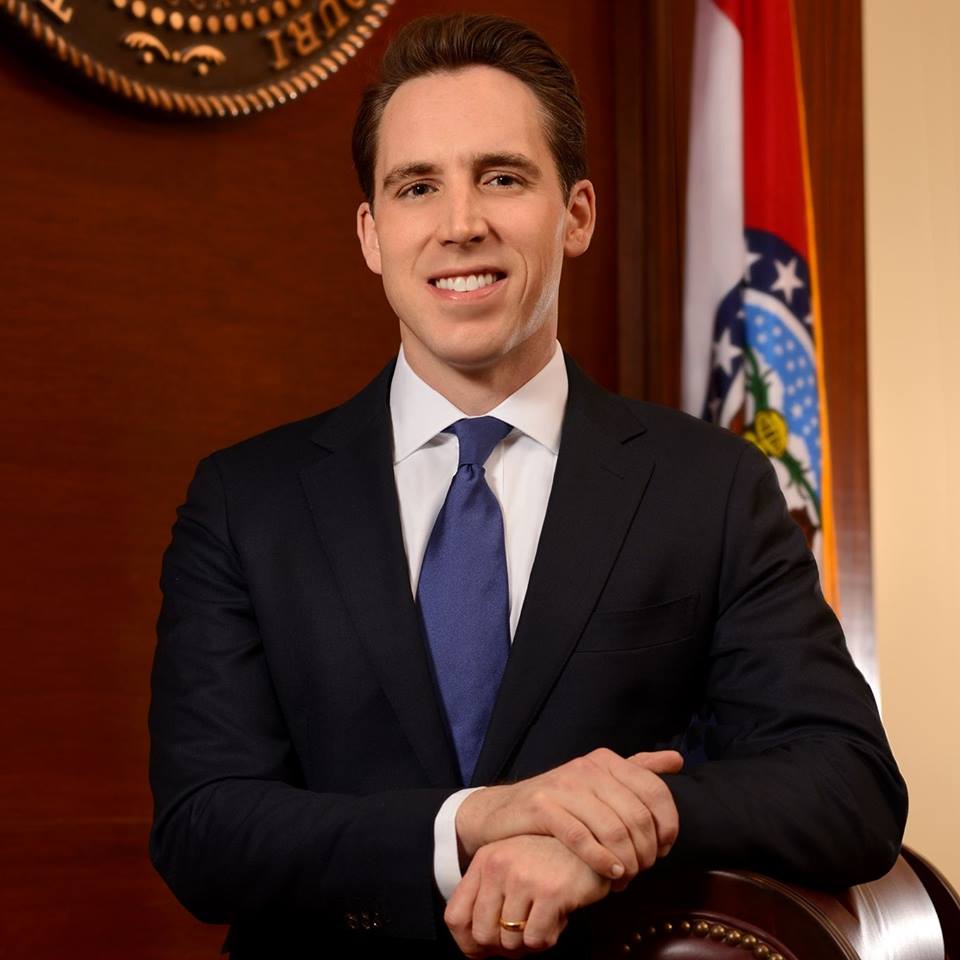
Hawley was sworn in as Attorney General on January 9, 2017, by Missouri Supreme Court Chief Justice Patricia Breckenridge.
3.2.1. Death of Tory Sanders
On May 5, 2017, Tory Sanders, a Black motorist experiencing confusion, ran out of gas in rural Mississippi County, Missouri. After asking a gas station attendant to call the police for assistance, deputies placed him in protective custody at the county jail. His mental state deteriorated further, and he resisted attempts to transfer him to a medical facility. Sheriff Cory Hutcheson and jail staff repeatedly used pepper spray and Tasers on Sanders throughout the day. Hutcheson eventually led a team into Sanders' cell, where Sanders went into cardiac arrest and died after being swarmed.
In an unrelated case, Sheriff Hutcheson later pleaded guilty in 2019 to wire fraud and identity theft for illegally tracking private cellphone users, leading to his resignation and a six-month federal prison sentence.
In 2017, Hawley's office determined that those involved in the assault on Sanders had not intended his death, and consequently, no murder charges were filed. This decision drew strong criticism from Black lawmakers and the NAACP's Missouri chapter, who felt that justice had not been served for Sanders. No one was held criminally accountable for his death. Following the murder of George Floyd in 2020, renewed interest in Sanders's case emerged, with activists hoping the new state Attorney General, Eric Schmitt, would file charges. However, in February 2021, Schmitt also declined to file charges, citing the expiration of the three-year statute of limitations for manslaughter and insufficient evidence for first- or second-degree murder.
3.2.2. Opioid manufacturer lawsuit and investigation
In June 2017, Hawley announced that Missouri had filed a lawsuit against three major pharmaceutical companies: Endo Health Solutions, Janssen Pharmaceuticals, and Purdue Pharma. The lawsuit alleged that these companies had concealed the dangers of prescription painkillers, thereby contributing significantly to the opioid epidemic. The state sought damages in the order of hundreds of millions of dollars, arguing that the companies had violated Missouri's consumer protection and Medicaid laws.
In August 2017, Hawley expanded his efforts by initiating an investigation into seven opioid distributors: Allergan, Depomed, Insys, Mallinckrodt, Mylan, Pfizer, and Teva Pharmaceuticals. This investigation aimed to scrutinize their marketing practices. By October 2017, the scope of the investigation further widened to include AmerisourceBergen, Cardinal Health, and McKesson Corporation, the three largest U.S. opioid distributors.
3.2.3. Rape kit audit
On October 29, 2017, the Columbia Missourian published an exposé revealing a substantial backlog of untested rape kits in Missouri and the state's failure to address it, despite calls from survivors and law enforcement. On November 29, Hawley responded by announcing a statewide audit to determine the exact number of untested rape kits. The audit's findings, released in May 2018, revealed nearly 5,000 such kits.
In August 2018, One Nation, a Republican-aligned non-profit, ran commercials crediting Hawley with "uncovering" the backlog. The St. Louis Post-Dispatch criticized this claim as misleading, noting that Hawley's actions were a response to existing concerns rather than an original investigation. In September 2020, Hawley's successor, Attorney General Eric Schmitt, announced that 16 of the tested rape kits had yielded DNA matches in the national database, leading to 11 identifications of known criminals and potential prosecutions.
3.2.4. Investigations into tech companies
In November 2017, Hawley launched an investigation into Google's business practices, examining whether they violated state consumer protection and antitrust laws. The probe focused on the data Google collects from users, its use of content providers' material, and potential biases in its search engine results.
Following the Facebook-Cambridge Analytica data scandal in April 2018, Hawley's office issued a subpoena to Facebook. This investigation aimed to determine if Facebook adequately handled sensitive user data and if it collected more information than publicly disclosed.
3.2.5. Greitens scandals
In December 2017, The Kansas City Star reported that Missouri Governor Eric Greitens and his senior staff used Confide, a self-deleting messaging app, on personal phones, raising concerns about violations of Missouri's open records laws. Initially, Hawley declined to investigate, citing a Missouri Supreme Court ruling that prevented the Attorney General from simultaneously representing and taking legal action against a state officer. However, on December 20, 2017, he reversed course, stating his primary clients were "the citizens of the state" and announced an investigation. Hawley asserted that text messages between government employees, regardless of the device, should be treated as public records subject to disclosure. His investigation concluded that no laws had been broken, a finding criticized as "half-hearted" by six former Missouri attorneys general. Hawley's spokesperson dismissed these criticisms as partisan.
In January 2018, allegations surfaced that Greitens had blackmailed a woman with whom he had an affair. Hawley's office stated it lacked jurisdiction, and St. Louis circuit attorney Kimberly Gardner initiated an investigation. After a Missouri House of Representatives committee released a report on the allegations in April, Hawley publicly called for Greitens' immediate resignation. The following week, Gardner filed a second felony charge against Greitens, alleging his campaign illegally used donor and email lists from The Mission Continues, a veterans' charity Greitens founded. Hawley then announced an investigation into these new felony charges and, on April 30, a separate probe into potential Sunshine Law violations concerning a state employee managing Greitens' social media. Greitens responded by seeking a restraining order to block Hawley's investigations. On May 29, 2018, Greitens announced his resignation, effective June 1, a decision Hawley publicly approved.
3.2.6. Affordable Care Act lawsuit

In February 2018, Hawley joined 20 other Republican-led states in a lawsuit, California v. Texas, challenging the constitutionality of the Affordable Care Act (ACA). Despite concerns that the lawsuit could eliminate insurance protections for people with preexisting conditions, Hawley maintained that he supported such protections. In September 2018, amid criticism from his U.S. Senate opponent Claire McCaskill regarding the lawsuit's potential impact on pre-existing conditions, Hawley's office reiterated his support for these protections. He later published an op-ed in the Springfield News-Leader, proposing a taxpayer subsidy to reimburse insurance companies for covering high-cost patients with pre-existing conditions as an alternative to the ACA.
In December 2018, Judge Reed O'Connor ruled the entire ACA unconstitutional. However, on appeal, the Fifth Circuit did not agree that the entire law should be voided.
3.2.7. Sentencing of Bobby Bostic
In March 2018, Hawley defended the 1995 sentencing of Bobby Bostic to 241 years in prison. Bostic was 16 years old when he committed robbery and other crimes for which he received the harsh sentence. Bostic and the American Civil Liberties Union (ACLU) sought to appeal his sentence to the U.S. Supreme Court, arguing it violated the court's ruling in Graham v. Florida, which held that juveniles could not be sentenced to life imprisonment for non-homicide offenses.
In a Supreme Court filing, Hawley contended that Bostic's sentence did not violate the constitutional ban on cruel and unusual punishment and that Graham v. Florida applied only to sentences for a single crime. The judge who originally sentenced Bostic later expressed that she believed the sentence was too harsh and sought to join an amicus brief filed by 26 former judges, prosecutors, and law enforcement officials in support of Bostic. On April 24, 2018, the Supreme Court rejected Bostic's appeal.
3.2.8. State staff used for campaign and Sunshine Law violations
On November 14, 2022, Cole County Circuit Court Judge Jon Beetem ruled that Hawley's office had violated Missouri's open records law, known as the Sunshine Law, during his 2018 U.S. Senate campaign. The ruling found that Hawley's office had "knowingly and purposefully" withheld emails between his out-of-state political consultants and his taxpayer-funded staff. The judge fined the Attorney General's office 12.00 K USD. The investigation revealed that Hawley's staff used private email accounts, rather than government ones, to communicate with his political consultants. These consultants were found to have illegally provided direct guidance and tasks to Hawley's staff and led meetings during office hours within the Missouri Supreme Court building.
In 2023, the court ordered the state to pay over 240.00 K USD in legal fees for the case. An attorney involved in the case suggested that Hawley should pay these costs from the proceeds of his book Manhood: The Masculine Virtues America Needs rather than burdening taxpayers.
3.2.9. Catholic clergy investigation
In August 2018, following the release of a Pennsylvania grand jury report detailing over 1,000 cases of sexual abuse by Catholic clerics in that state, and protests by survivors in St. Louis, Hawley announced an investigation into potential cases of abuse within Missouri. Missouri was among several states, including Illinois, Nebraska, and New Mexico, to launch similar inquiries in response to the Pennsylvania report. Hawley pledged to investigate any crimes, publish a public report, and refer potential cases to local law enforcement. Archbishop of St. Louis Robert James Carlson vowed cooperation with the inquiry.
The investigation, which was continued by Hawley's successor, Eric Schmitt, resulted in the referral of 12 former priests for prosecution in September 2019, based on charges of sexual abuse of minors.
4. U.S. Senate
Hawley's tenure in the U.S. Senate has been characterized by his alignment with the populist wing of the Republican Party, his vocal criticism of "Big Tech" and China, and his prominent role in the events surrounding the 2020 presidential election and the January 6 Capitol attack.
4.1. Elections
4.1.1. 2018 Election
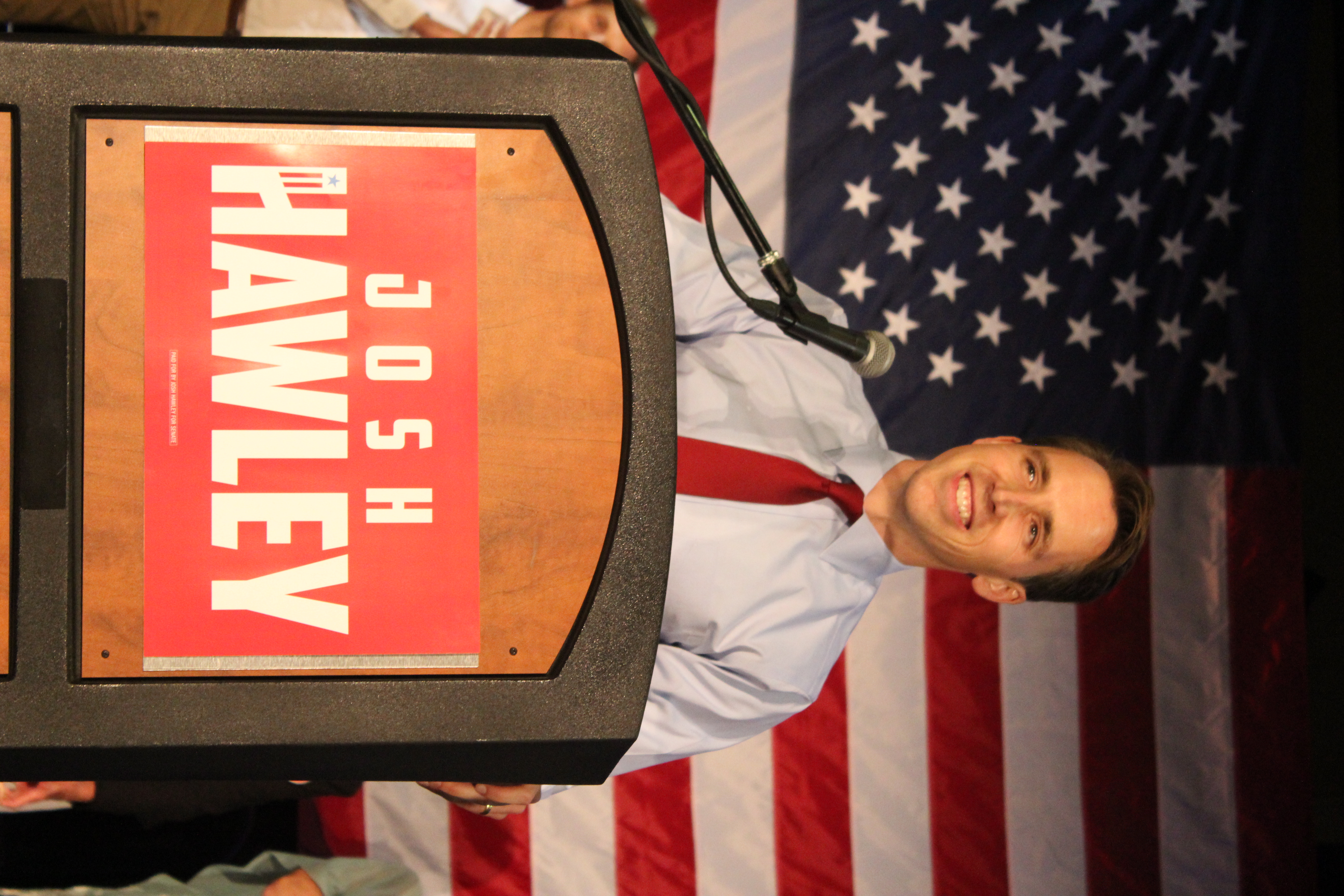
In August 2017, Josh Hawley formed an exploratory campaign committee for the U.S. Senate, and in October 2017, he officially declared his candidacy for the Republican nomination to challenge incumbent Democrat Claire McCaskill in Missouri's 2018 U.S. Senate election. Prior to his official announcement, four former Republican U.S. senators from Missouri-John Ashcroft, Kit Bond, John Danforth, and McCaskill's predecessor, Jim Talent-publicly urged Hawley to run.
Hawley received significant support from prominent Republicans, including Senate Majority Leader Mitch McConnell and President Donald Trump, who endorsed him in November 2017. The Senate Conservatives Fund also provided substantial backing. Hawley won a large majority of the vote in the Republican primary, which featured 11 candidates.
During the general election campaign, the Affordable Care Act (ACA) became a central issue, with both Hawley and McCaskill pledging to protect coverage for pre-existing conditions. McCaskill criticized Hawley for his involvement in a lawsuit seeking to overturn the ACA, which she argued could jeopardize these protections. Hawley, in turn, highlighted McCaskill's upcoming vote on the confirmation of CIA Director Mike Pompeo as Secretary of State, portraying her as obstructing President Trump. His campaign spokesperson stated, "Will Senator McCaskill ignore her liberal donors and support Mike Pompeo for Secretary of State, or will she stick with Chuck Schumer and continue to obstruct the president?"
Hawley faced bipartisan criticism for launching his Senate campaign less than a year after becoming Attorney General, especially given his prior campaign advertisements that criticized "ladder-climbing politicians." Hawley dismissed this, stating that a Senate bid was not on his mind during his Attorney General campaign.
During the campaign, Hawley released his and his wife's tax returns and urged McCaskill to release hers; McCaskill released her separately filed returns. When asked if Trump should release his returns, Hawley declined to comment. Hawley also criticized McCaskill's use of a private jet, dubbing her "Air Claire," but was himself criticized for accepting a ride on a private jet owned by a lobbyist for Rex Sinquefield.
In the November 2018 general election, Hawley defeated McCaskill with 51% of the vote to her 46%.
On December 6, 2018, Missouri Secretary of State Jay Ashcroft initiated an inquiry into whether Hawley had misused public funds for his Senate campaign. Hawley's office denied any wrongdoing, and Ashcroft closed the investigation on February 28, 2019, citing insufficient evidence that "an offense has been committed." However, a 2021 investigation by the New York Post revealed questionable campaign expenditures, such as an 80.04 USD charge at Jimmy Buffett's Margaritaville listed as "travel" during a lobbyist-funded trip to Universal Orlando. Hawley's office later stated he had reimbursed the campaign for these inappropriate expenditures.
4.1.2. 2024 Election
Hawley sought a second term in the U.S. Senate in 2024, facing Democratic nominee Lucas Kunce, a U.S. Marine veteran. Hawley and Kunce engaged in a public dispute regarding debates, with Hawley pushing for a forum hosted by the Missouri Farm Bureau, and Kunce advocating for broadcast debates, citing potential legal complications with the Farm Bureau's endorsement of Hawley.
Hawley's campaign received 5.00 K USD from the Teamsters, but he faced criticism from other Missouri union leaders. At a campaign event at First Baptist Church in Ozark, Missouri, Hawley falsely claimed that the proposed Amendment 3, an abortion rights initiative, was related to transgender health care. He also drew rebuke for his extensive use of private jets during his campaign, spending 132.00 K USD between mid-December 2023 and June 2024. Hawley was reelected in November 2024.
4.2. Tenure
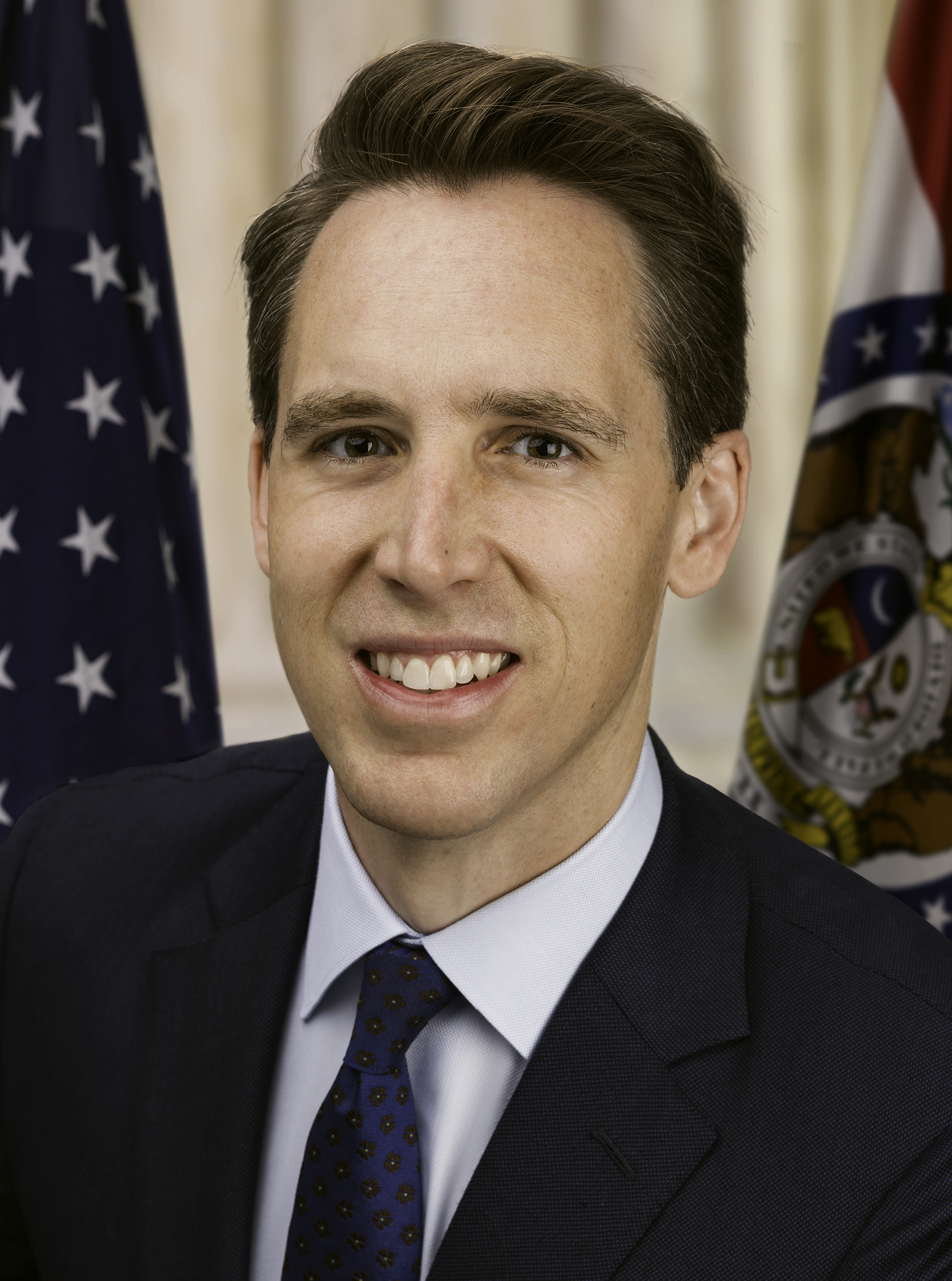
Hawley was sworn in as a U.S. Senator on January 3, 2019.
In June 2019, Hawley played a significant role in preventing the appointment of Michael S. Bogren as a district judge for the Western District of Michigan. Hawley accused Bogren of "anti-religious animus" in a past case where Bogren had compared Catholic views on homosexuality to the Ku Klux Klan's views on interracial marriage.
In December 2020, Hawley joined President Donald Trump in advocating for an increase in the initial 600 USD coronavirus relief checks, provided by the Consolidated Appropriations Act, 2021, to 2.00 K USD. This stance aligned him with an "unlikely ally" in Senator Bernie Sanders, an independent who caucuses with Democrats. Alongside Sanders and Chuck Schumer, Hawley attempted to force a vote to increase the checks, but the effort was blocked by other Republican senators.
By February 8, 2021, after voting against the nomination of Denis McDonough for Secretary of Veterans Affairs, Hawley became the only senator to vote against all of President Joe Biden's cabinet nominees, with the sole exception of Cecilia Rouse, whom he voted to confirm as chair of the Council of Economic Advisers. Ten months into Biden's term, Hawley had approved only four of 118 executive appointments that received a Senate vote, none in the preceding five months. Political scientist Wendy Schiller noted that Hawley's obstruction appeared to lack a clear policy goal, instead serving to punish the Biden administration.
On August 3, 2022, Hawley cast the sole vote against the Senate resolution to agree to Sweden and Finland joining the NATO defense alliance; the resolution passed 95-1. Before and after the vote, Hawley argued that these resolutions were not in America's best interest, asserting that China posed a greater threat than Russia. Politico noted that Hawley had been working for months to differentiate himself on national security, beginning with his blockade of Pentagon nominees in protest of the U.S. withdrawal from Afghanistan and his opposition to a 40.00 B USD aid package for Ukraine.
4.2.1. Committee assignments
For the 117th United States Congress, Hawley was assigned to four Senate committees:
- Committee on Armed Services
- Subcommittee on Airland
- Subcommittee on Personnel
- Subcommittee on SeaPower
- Committee on Homeland Security and Governmental Affairs
- Emerging Threats and Spending Oversight
- Governmental Operations and Border Management
- Committee on Small Business and Entrepreneurship
- Committee on the Judiciary
- Subcommittee on Competition Policy, Antitrust, and Consumer Rights
- Subcommittee on Criminal Justice and Counterterrorism
- Subcommittee on Human Rights and the Law (Ranking)
- Subcommittee on Privacy, Technology, and the Law
For the 116th United States Congress, Hawley was assigned to five Senate committees:
- Committee on Armed Services
- Subcommittee on Emerging Threats and Capabilities
- Subcommittee on Seapower
- Subcommittee on Strategic Forces
- Committee on Homeland Security and Governmental Affairs
- Subcommittee on Federal Spending Oversight and Emergency Management
- Subcommittee on Investigations (Permanent)
- Committee on the Judiciary
- Subcommittee on Antitrust, Competition Policy and Consumer Rights
- Subcommittee on Border Security and Immigration
- Subcommittee on Crime and Terrorism (Chair)
- Committee on Small Business and Entrepreneurship
- Special Committee on Aging
4.2.2. Foreign policy
Hawley's foreign policy views have evolved, shifting from an earlier interventionist stance to an "America First" approach. He has become a staunch opponent of prolonged U.S. military engagements abroad and views China as the paramount threat to U.S. national security. He has criticized both left and right-wing "cosmopolitan priorities," arguing that the "quest to turn the world into a liberal order of democracies was always misguided," as it "depended on unsustainable American sacrifice and force of arms." He has also called for the abolition of the World Trade Organization (WTO), asserting it does not serve American interests and "enabled the rise of China." During the Biden administration, Hawley systematically blocked quick confirmation of Biden's nominees for foreign policy and intelligence posts, causing significant delays.
4.2.3. Domestic policy
Hawley's domestic policy positions reflect a strong conservative ideology, emphasizing national sovereignty, traditional values, and a critical stance on issues related to cultural shifts and the influence of large corporations.
4.2.4. Relationship with Donald Trump
Hawley has been characterized as a loyal supporter of Donald Trump. He voted to acquit Trump during his first Senate impeachment trial, accusing Democrats of having abused the Constitution and declaring it "the first purely partisan impeachment in our history." The day after Trump's acquittal by the Republican-held Senate, Trump publicly praised Hawley for his key role.
The St. Louis Post-Dispatch published an editorial criticizing Hawley and Senator Roy Blunt for not distancing themselves from the January 6, 2021 storming of the United States Capitol and their continued support for Trump. Both senators voted to acquit Trump in his second impeachment trial. During this trial, Hawley was observed in the Senate gallery, rather than at his desk on the Senate floor, reportedly reviewing paperwork. He later dismissed the proceedings as "a total kangaroo trial."
4.2.5. Supreme Court nominations
Hawley's first commercial in his 2018 Senate campaign focused on his support for Brett Kavanaugh's nomination to the U.S. Supreme Court. After Kavanaugh was accused of sexual assault, Hawley staunchly defended him, asserting that Democrats had staged an "ambush." On October 27, 2020, Hawley voted to confirm Amy Coney Barrett to the Supreme Court.
Hawley was sharply critical of Ketanji Brown Jackson's 2022 nomination to the Supreme Court. He claimed that her tenure as a judge and member of the United States Sentencing Commission showed a "pattern of letting child porn offenders off the hook for their appalling crimes." However, multiple news media fact-checks disagreed with Hawley's assertions, and conservative former prosecutor Andrew C. McCarthy described the allegation as "meritless to the point of demagoguery." Hawley and other Republican senators focused on these charges during Jackson's confirmation hearings, which fueled right-wing conspiracy and QAnon theories.
On September 9, 2020, President Trump announced that Hawley, Ted Cruz, and Tom Cotton were on his shortlist for Supreme Court nominations should a vacancy arise. Hawley expressed his appreciation but declined the offer, stating, "Missourians elected me to fight for them in the Senate." After Ruth Bader Ginsburg's death on September 18, Trump instead nominated Amy Coney Barrett on September 29.
4.2.6. Attempts to overturn the 2020 presidential election results and January 6 Capitol attack
After Joe Biden won the 2020 United States presidential election, Hawley announced on December 30, 2020, his intention to object to the Senate's certification of the Electoral College vote count on January 6, 2021. He was the first senator to do so. President Trump had refused to concede and made frequent baseless claims of fraud in the election. Hawley stated that his attempt to reverse the election result was on behalf of those "concerned about election integrity" and made numerous statements suggesting that Trump could potentially remain in office. The New York Times reported that Hawley was elevating false claims that President-elect Joe Biden stole the election, a maneuver that prompted bipartisan condemnation as undemocratic.
On December 30, 2020, Hawley asserted that "some states, particularly Pennsylvania, failed to follow their own state election laws." He reiterated this claim in a February 2021 fundraising email, a view that was supported by a Pennsylvania appellate court in January 2022. However, other courts had rejected such claims. Later in 2022, the Pennsylvania Supreme Court overturned the appellate court's argument, and the U.S. Supreme Court declined to consider an appeal to reverse the state's election results.
On December 30, 2020, after Hawley tweeted his intention to object to Biden's victory, Walmart's official Twitter account responded, "Go ahead. Get your 2 hour debate. #soreloser." Hawley retorted by accusing Walmart of using "slave labor" and "driv[ing] mom and pop stores out of business." Walmart deleted its tweet, apologizing to Hawley and stating it was "mistakenly posted by a member of our social media team." The incident led to the hashtag #BoycottWalmart trending on Twitter.
On January 4, 2021, Hawley tweeted that his Washington, D.C. home had been vandalized and his family threatened by "Antifa scumbags" in an act of "leftwing violence" due to his claims of fraud. He stated he was in Missouri at the time. ShutdownDC, the group that organized the event, described it as a peaceful candlelight vigil and denied vandalizing Hawley's house or knocking on his door. A video shared by the group showed protesters writing on the sidewalk in chalk, chanting through a megaphone, and leaving a copy of the U.S. Constitution at Hawley's door. Police in Vienna, Virginia, where the home is located, confirmed the protesters were peaceful, with "no issues, no arrests" necessary, and a police spokesman stated they "didn't think it was that big of a deal."
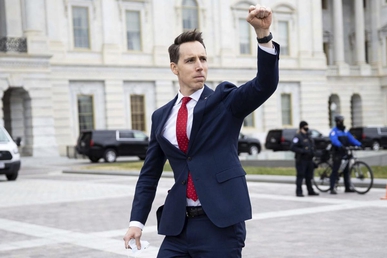
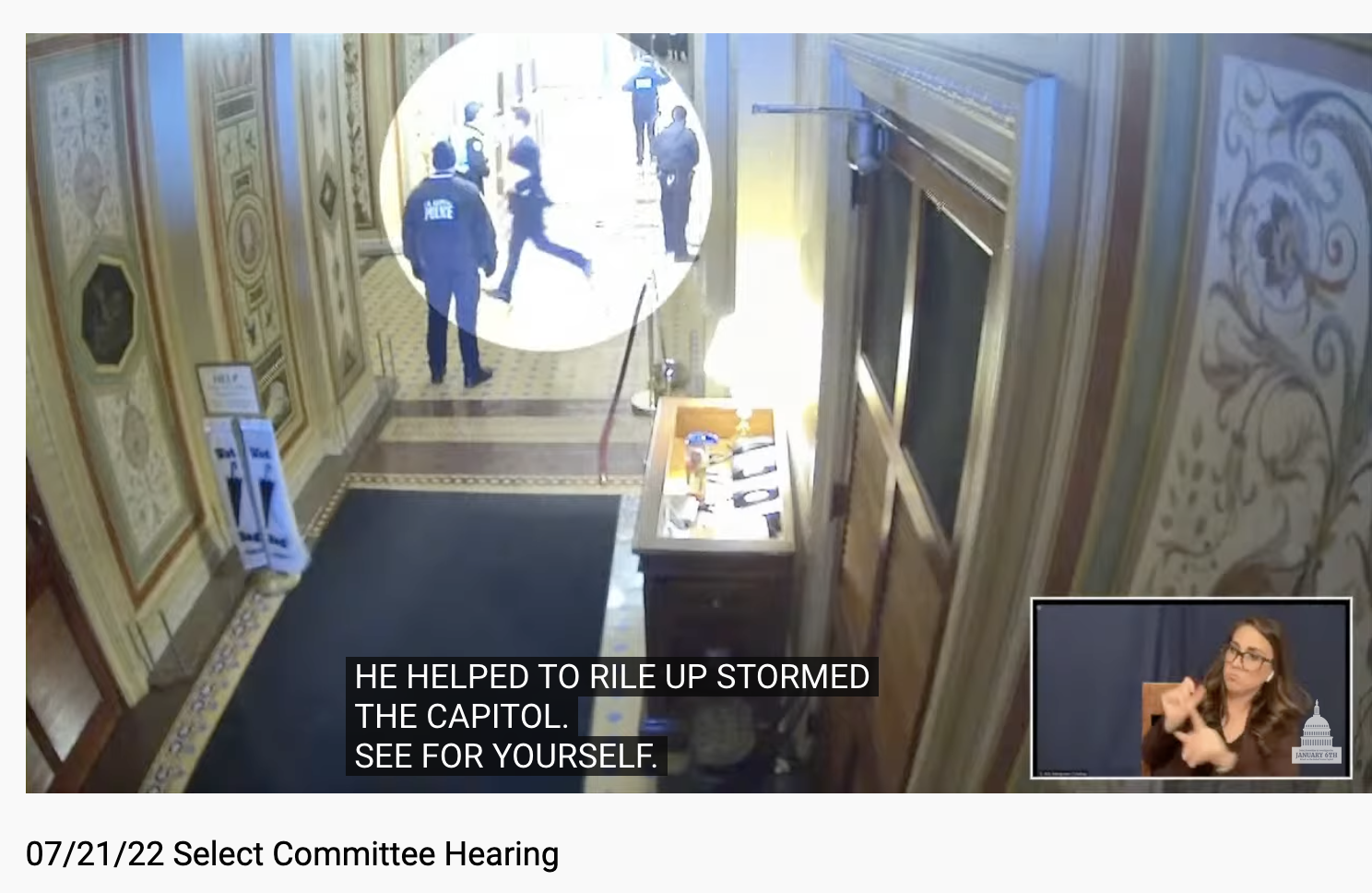
On January 6, 2021, as Congress convened to count the electoral votes for the 2020 presidential election, they were interrupted by pro-Trump rioters who stormed the U.S. Capitol building, forcing members of Congress to evacuate. Before the counting of the votes, to which Hawley had publicly announced he would object, he was photographed saluting the protesters with a raised fist outside the Capitol.
The photograph immediately became a subject of intense controversy. The Kansas City Star called it "the image that will haunt Josh Hawley" and "one of the iconic images to emerge from the day the Capitol was breached by rioters." Pulitzer Prize-winning columnist Tony Messenger of the St. Louis Post-Dispatch stated that "the staging was perfect" and suggested the photograph be known as Hawley: The Face of Sedition. Tom Coleman, a former U.S. representative from Missouri and a fellow Republican, commented that Hawley's "clenched fist in front of the Capitol will seal his fate." The photographer, Francis Chung, declined to comment on the political impact, saying the image "is what it is" and "kind of speaks for itself." Later that day, video footage showed Hawley running through the Capitol, fleeing the rioters who had invaded the building.
On January 6, The Kansas City Star editorial board published an editorial arguing that Hawley "has blood on his hands" due to the event, which they called a "coup attempt." They asserted that "no one other than President Donald Trump himself is more responsible" than Hawley, who "put out a fundraising appeal while the siege was underway." The next day, the paper published another editorial calling for Hawley to resign or be removed from office. Similarly, The St. Louis Post-Dispatch published an editorial on January 7 calling for Hawley's resignation and for Republican "silent enablers" to denounce Trumpism, writing, "Hawley's tardy, cover-his-ass condemnation of the violence ranks at the top of his substantial list of phony, smarmy and politically expedient declarations" and that "Trumpism must die before it morphs into Hitlerism. Defenders like Hawley deserve to be cast into political purgatory for having promoted it."
Political scientists Henry Farrell and Elizabeth N. Saunders described Hawley's action as a "cynical theatrical gesture" where he was "pursuing short-term political gain at the risk of long-term chaos." John Danforth, a former Republican senator from Missouri and Hawley's political mentor, stated that supporting Hawley was the "worst mistake I ever made in my life" and directly blamed him for the riot. David M. Kennedy, Hawley's academic adviser at Stanford, expressed that he "absolutely could not have predicted that the bright, idealistic, clear-thinking young student that I knew would follow this path" and was "more than a little bamboozled by it, certainly distressed by it," though he did not believe Hawley directly incited the mob. Prominent conservative columnist George Will wrote on January 6 that Hawley, Trump, and Senator Ted Cruz "will each wear the scarlet S of a seditionist." On January 9, NBC News reported that several Republican Party insiders anonymously condemned Hawley's actions, with one strategist comparing his fist salute to Michael Dukakis's tank photograph during the 1988 presidential campaign, making him "look phony and out of place and like a doofus." After the riot, Hawley's approval rating dropped by six percentage points among Missouri voters and nine among Missouri Republicans.
In the wake of the riot, other Republican lawmakers attempted to persuade Hawley to abandon his objections to Biden's win. However, he voted in support of the objections to certifying Arizona's and Pennsylvania's electoral votes, claiming that Pennsylvania election officials had violated the state's constitution. Both senators from Pennsylvania rejected his objections, and the Senate rejected his objections by votes of 6-93 and 7-92, respectively.
Some political commentators and Democratic lawmakers dubbed Hawley and other senators who sought to overturn the election the Sedition Caucus. Hawley has since faced bipartisan calls for his resignation, to which he has responded that he "will never apologize for giving voice to the millions of Missourians and Americans who have concerns about the integrity of our elections." Thousands of law school students and alumni, including from Hawley's alma mater Yale Law School, also called for Hawley and Cruz to be disbarred. On January 9, hundreds of protesters gathered in Downtown St. Louis in front of the Old Courthouse to demand Hawley's resignation.
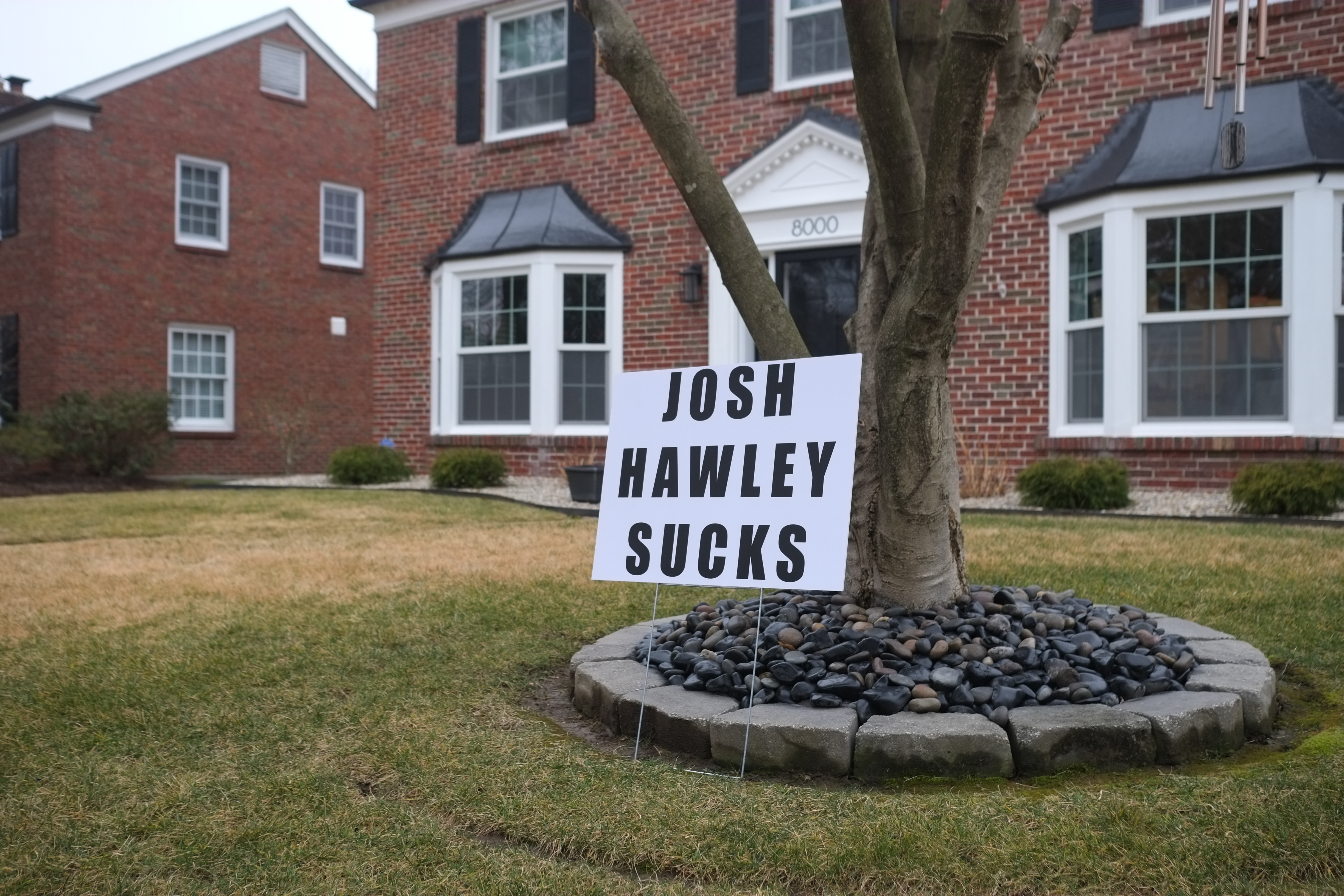
Several political donors and companies associated with Hawley subsequently cut off financial ties. David Humphreys, who had donated over 6.00 M USD to Hawley's campaigns with his mother and sister, called for Hawley to be censured, stating he had "revealed himself as a political opportunist willing to subvert the Constitution and the ideals of the nation he swore to uphold." On January 7, Simon & Schuster canceled its planned publication of Hawley's book The Tyranny of Big Tech, citing that it "cannot support Senator Hawley after his role in what became a dangerous threat." The book was later picked up by Regnery Publishing, a conservative publisher. On January 11, several companies, including Airbnb, American Express, AT&T, Best Buy, Dow Inc., and Mastercard, announced they would cease fundraising for all Republicans who objected to Biden's victory, including Hawley. Hallmark Cards, based in Kansas City, Missouri, specifically requested that Hawley and Senator Roger Marshall of Kansas return all contributions. Conversely, the Senate Conservatives Fund, a conservative political action committee, began aggressively supporting Hawley after the riot, raising 700.00 K USD and spending nearly 400.00 K USD on texts and emails in his support. A group of former McCaskill staffers created a political action committee aimed at unseating Hawley with the backronym JOSH PAC (Just Oust Seditious Hacks).
On January 21, seven Democratic senators filed a complaint against Hawley and Cruz with the Senate Ethics Committee, arguing that they "lent legitimacy to the mob's cause and made future violence more likely." Hawley dismissed the complaint as "a flagrant abuse of the Senate ethics process and a flagrant attempt to exact partisan revenge." He filed his own ethics complaint against the seven senators, alleging their complaint was unethical due to potential coordination with Democratic Party leadership and claiming he was a victim of cancel culture.
After the storming of the Capitol, several individuals mistakenly sent disparaging messages intended for Hawley to Representative Josh Harder, a California Democrat, due to the similarity of their names. On May 28, 2021, Hawley voted against creating an independent commission to investigate the riot.
On July 21, 2022, the House Select Committee broadcast video footage of Hawley running through the halls of Congress to escape the mob on January 6, starkly contrasting it with his earlier fist-raised encouragement of the crowd. The video provoked laughter in the chamber and widespread commentary on social media, including phrases like "Run Josh Run" (coined by Dan Rather) and numerous Internet memes. In March 2023, Tucker Carlson criticized the footage of Hawley running as "deceptively edited," claiming the committee did not show other senators fleeing. FactCheck.org concluded that Carlson's statement was misleading.
In McCay Coppins's 2023 biography of Mitt Romney, Romney: A Reckoning, Romney described Hawley as "the smartest person in the room" but stated he "doesn't see a future of working with him on anything" due to Hawley's obstructions to certifying electoral votes in the 2020 presidential election.
4.3. Caucus memberships
- Senate Taiwan Caucus
5. Personal Life
In 2010, Hawley married Erin Morrow, a fellow Yale Law School graduate who is an associate professor of law at the Regent University School of Law. They have three children.
Following complaints that, after becoming Attorney General, he was not adhering to a statutory requirement that the Attorney General reside within the city limits of the state capital (Jefferson City), Hawley began renting an apartment there, while his family continued to live in Columbia, Missouri. The Hawleys own a house in Vienna, Virginia, which they purchased in 2019 after Hawley was elected to the U.S. Senate, following the sale of their Columbia home. Hawley's voter registration uses his sister's address in Ozark, Missouri, to maintain his eligibility to run for Missouri's U.S. Senate seat.
Hawley was raised Methodist, but he and his family now attend an Evangelical Presbyterian Church.
6. Publications
- Hawley, Joshua D. (2008). Theodore Roosevelt, Preacher of Righteousness. Yale University Press.
- Hawley, Joshua D. (2014). "The Transformative Twelfth Amendment". William & Mary Law Review. 55 (4): 1501-86.
- Hawley, Joshua D. (2014). "The Intellectual Origins of (Modern) Substantive Due Process". Texas Law Review. 93 (2): 275-350.
- Hawley, Joshua D. (2015). "Return to Political Theology". Notre Dame Law Review. 90 (4): 1631-62.
- Hawley, Joshua (June 4, 2019). "The Age of Pelagius". Christianity Today.
- Hawley, Joshua D. (2021). The Tyranny of Big Tech. Regnery Publishing.
- Hawley, Josh (2023). Manhood: The Masculine Virtues America Needs. Regnery Publishing.
7. Electoral History
| 2016 Republican Missouri Attorney General primary | ||
|---|---|---|
| Candidate | Votes | Percentage |
| Josh Hawley | 415,702 | 64.2% |
| Kurt Schaefer | 231,657 | 35.8% |
| Total | 647,359 | 100.0% |
| 2016 Missouri Attorney General election | ||||
|---|---|---|---|---|
| Party | Candidate | Votes | Percentage | Change |
| Republican Party (United States) | Josh Hawley | 1,607,550 | 58.5% | +17.71% |
| Democratic Party (United States) | Teresa Hensley | 1,140,252 | 41.5% | -14.31% |
| Total | 2,747,802 | 100.0% | N/A | |
| 2018 Republican U.S. Senate primary in Missouri | ||
|---|---|---|
| Candidate | Votes | Percentage |
| Josh Hawley | 389,878 | 58.6% |
| Tony Monetti | 64,834 | 9.7% |
| Austin Petersen | 54,916 | 8.3% |
| Kristi Nichols | 49,640 | 7.5% |
| Christina Smith | 35,024 | 5.3% |
| Ken Patterson | 19,579 | 2.9% |
| Peter Pfeifer | 16,594 | 2.5% |
| Courtland Sykes | 13,870 | 2.1% |
| Fred Ryman | 8,781 | 1.3% |
| Brian Hagg | 6,871 | 1.0% |
| Bradley Krembs | 4,902 | 0.7% |
| Total | 664,889 | 100.0% |
| 2018 U.S. Senate election in Missouri | ||||
|---|---|---|---|---|
| Party | Candidate | Votes | Percentage | Change |
| Republican Party (United States) | Josh Hawley | 1,254,927 | 51.4% | +12.27% |
| Democratic Party (United States) | Claire McCaskill (incumbent) | 1,112,935 | 45.6% | -9.24% |
| Independent | Craig O'Dear | 34,398 | 1.4% | N/A |
| Libertarian Party (United States) | Japheth Campbell | 27,316 | 1.1% | -4.95% |
| Green Party (United States) | Jo Crain | 12,706 | 0.5% | N/A |
| Write-in | 7 | <0.01% | N/A | |
| Total | 2,442,289 | 100.0% | N/A | |
| 2024 United States Senate election in Missouri | ||||
|---|---|---|---|---|
| Party | Candidate | Votes | Percentage | Change |
| Republican Party (United States) | Josh Hawley (incumbent) | 1,651,907 | 55.57% | -4.19% |
| Democratic Party (United States) | Lucas Kunce | 1,243,728 | 41.84% | -3.73% |
| Libertarian Party (United States) | W.C. Young | 35,671 | 1.20% | -0.08% |
| Better Party | Jared Young | 21,111 | 0.71% | N/A |
| Green Party of the United States | Nathan Kline | 20,123 | 0.68% | -0.16% |
| Write-in | 19 | 0.00% | - | |
| Total | 2,972,559 | 100.00% | N/A | |
8. Assessment and Criticism
Josh Hawley's political career has been met with significant assessment and criticism, particularly concerning his actions surrounding the 2020 presidential election and the January 6 Capitol attack. Critics, including former political mentors and prominent media outlets, have accused him of political opportunism and of undermining democratic institutions.
His "raised fist" salute to protesters on January 6, 2021, and subsequent efforts to object to the Electoral College certification, were widely condemned as inflammatory and contributing to the unrest. The Kansas City Star and The St. Louis Post-Dispatch, Missouri's two major newspapers, published editorials calling for his resignation, with one stating he had "blood on his hands." Political scientists and commentators labeled him as part of a "Sedition Caucus" and described his actions as a "cynical theatrical gesture" aimed at short-term political gain. His former mentor, John Danforth, publicly stated that supporting Hawley was "the worst mistake I ever made in my life."
Beyond January 6, Hawley has faced criticism for his evolving stances on issues such as labor rights and corporate taxes, leading some to question the consistency of his populist claims. His controversial remarks about "cosmopolitan elites" drew accusations of antisemitism from Jewish organizations and political commentators. Additionally, his investigations as Attorney General, such as the one into Governor Eric Greitens' use of a secret messaging app, were sometimes criticized as "half-hearted." A court ruled that his office "knowingly and purposefully" violated Missouri's Sunshine Law during his Senate campaign by withholding emails, resulting in a fine and substantial legal fees. His voting record in the Senate, particularly his systematic blocking of President Biden's nominees and his sole vote against NATO expansion for Sweden and Finland, has been characterized as obstructionist and not aligned with traditional U.S. strategic interests by some observers.
9. See Also
- List of attorneys general of Missouri
- List of law clerks of the Supreme Court of the States (Chief Justice)
- List of United States senators from Missouri
- Neopatriarchy
- Sedition Caucus